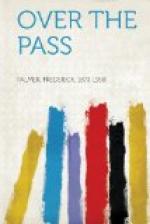He was the son of a New England country clergyman, to whom working his way through college in order to practise a profession made no appeal. Birth and boyhood in poverty had taught him, from want of money, the power of money. He sought the centre of the market-place. At sixteen he was a clerk, marked by his industry not less than by his engaging manners, on six dollars a week in the little store that was the site of his present triumph. Of course he became a partner and then owner. It was his frequent remark, when he turned reminiscent, that if he could only get as good clerks as he was in his day he would soon have a monopoly of supplying New York and its environs with all it ate and wore and needed to furnish its houses; which raises the point that possibly such an equality of high standards in efficiency might make all clerks employers.
The steady flame of his egoism was fanned with his Successes. Without real intimates or friends, he had an effective magnetism in making others do his bidding. It had hardly occurred to him that his discovery of the principle of never doing anything yourself that you can win others to do for you and never failing, when you have a minute to spare, to do a thing yourself when you can do it better than any assistant, was already a practice with leaders in trade and industry before the Pharaohs.
Life had been to him a ladder which he ascended without any glances to right or left or at the rung that he had left behind. The adaptable processes of his mind kept pace with his rise. He made himself at home in each higher stratum of atmosphere. His marriage, delayed until he was forty and already a man of power, was still another upward step. Alice Jamison brought him capital and position. The world was puzzled why she should have accepted him; but this stroke of success he now considered as the vital error of a career which, otherwise, had been flawlessly planned. Yet he could flatter his egoism with the thought that it was less a fault of judgment than of the uncertainty of feminine temperament, which could not be measured by logic.
New York saw little of Mrs. Wingfield after Jack’s birth. Her friends knew her as a creature all life and light before her marriage; they realized that the life and light had passed out of her soon after the boy came; and thenceforth they saw and heard little of her. She had given herself up to the insistent possessorship and company of her son. Those who met her when travelling reported how frail she was and how constrained.
Jack was fourteen when his mother died. He was brought home and sent to school in America; and two-years later Dr. Bennington announced that the slender youngster, who had been so completely estranged from the affairs of the store, must matriculate in the ozone of high altitudes instead of in college, if his life were to be saved. Whether Jack were riding over the mesas of Arizona or playing in a villa garden in Florence, John Wingfield, Sr.’s outlook on life was the same. It was the obsession of self in his affairs. After the eclipse of his egoism the deluge. The very thought that anyone should succeed him was a shock reminding him of growing age in the midst of the full possession of his faculties, while he felt no diminution of his ambition.




